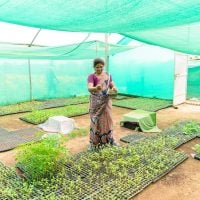Deadline: 24 January 2020
The Livelihoods and Food Security (LIFT) Fund has launched the Technical Capacity Building for Nutrition Programming to provide technical support to LIFT Implementing Partners (IPs) to improve the quality of effective nutrition programming under the LIFTstrategy 2019-2023.
The Livelihoods and Food Security (LIFT) Fund is a multi-donor fund established in 2009 to address food insecurity and income poverty in Myanmar. LIFT 2019-2023 is funded by seven donors – the United Kingdom, the European Union, Australia, Switzerland, the United States, Canada and Ireland. The United Nations Office for Project Services (UNOPS) is the Fund Manager for LIFT, administrating the funds and providing monitoring and oversight services.
The project will cooperate with LIFT and Access to Health, both working on nutrition-sensitive and nutrition-specific interventions that support the Government of Myanmar’s nutrition policy agenda. Under the new phase of LIFT and Access to Health, both funds are shifting their focus to conflict-affected areas (Rakhine, Mon, Thanitharyi, Kayin, Kayah and Kachin/Northern Shan) and inclusion and social cohesion, with internally displaced people (IDPs) and returnees as key beneficiaries.
The overall goal of the LIFT Fund is to achieve a sustained reduction in the number of people living in hunger and poverty in Myanmar. LIFT strengthens the resilience and livelihoods of poor and vulnerable populations through interventions to raise income, decrease vulnerability, improve nutrition and support pro-poor policy development.
LIFT will accept proposals that address the key components of this objective:
- Technical Capacity Building: Providing targeted technical capacity building for LIFT IPs particularly those that are working in conflict-affected areas (Rakhine, Mon, Thanitharyi, Kayin, Kayah and Kachin/Northern Shan) under the new LIFT programme, including Ethnic Service Providers (ESPs) and local Civil Society Organizations (CSOs). This component should include providing support to partners to deliver interventions which are high quality, evidence based and systems strengthening and which operating along known causal pathways for maximum nutrition impact.
- Working with Government departments and ESPs to support the adaptation or development of curriculum and trainings: Collaborating with MoHS, and MOALI, MoE and DSW and ESPs to share learning, materials and curriculums in support of government and non-government cadre to deliver nutrition sensitive interventions. Curriculums and materials should reflect and align with other guidelines, policies and strategies led by MS-NPAN sector ministries and nutrition sector partners. A systems strengthening approach should be promoted as part for the development of materials to improve sustainability and alignment of technical approaches across different platforms.
- Knowledge Gateway for IPs: Bringing global learning to IPs specifically in areas such as nutrition sensitive agriculture programming and SBC (Social Behaviour Change) approaches as well as ensuring local research is influencing project implementation. The project should engage with SUN networks and other coordination groups under the MS-NPAN framework.
- Facilitating a common technical approach: In consultation with LIFT, ACCESS, NNC, ESPs, MS-NPAN stakeholders and partners, provide support to ensure projects are applying common approaches within programme areas, learning from each other in providing quality nutrition interventions that are applying a systems strengthening approach.
- Support for Access to Health Fund partners in Joint Areas (Rakhine, Mon, Kayin, Kayah, Chin and Kachin/Northern Shan): Conduct a capacity assessment of Access to Health Fund Implementing Partners and FMO to understand the extent to which nutrition is adequately integrated into the programme and to identify needs for technical support. Provide targeted technical nutrition support plans where needed for Access to Health Fund partners specifically and Ethnic Service Providers in conflict affected areas to ensure effective alignment of technical approaches and facilitation of joint planning and collaborative implementation. Note: The total proposed costs for this particular deliverable must not exceed $100,000 to be carried out within the first year.
- Strategy for sustainability: As the need for a technical capacity building within the nutrition sector continues, the project should identify options for a sustainable exit strategy, institutionalising where possible to reflect the needs of the various stakeholders.
Funding Information
- The provisional allocation for LIFT’s work to support this call is up to USD 1,500,000, for one grant.
- The funding allocation maybe increased after year 1 based on the needs identified from the Access to Health Capacity Assessment.
For more information, visit https://themimu.info/sites/themimu.info/files/call-for-proposals/20191202_LIFT_CfP_nutrition-technical-proposal.pdf









































